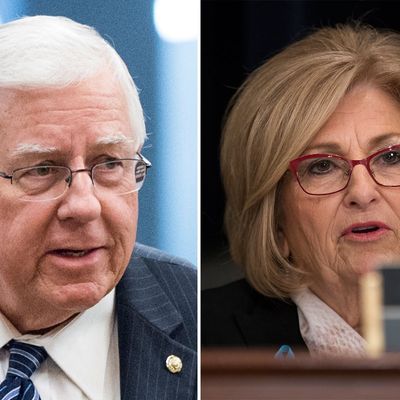
With the news that Mitch McConnell is delaying action on the Senate health-care bill until after the Independence Day recess, it could be late July before we know its ultimate fate. That’s when congressional Republicans figure they have to get this legislation out of the way once and for all so that they can clear the decks for an even bigger priority: a budget resolution for fiscal year 2018 that will set up a non-filibusterable vote on the upper-end tax cuts the GOP has been planning from the moment it became clear they would control both the White House and Congress this year.
But the close proximity of this fiscal year 2017 budget-reconciliation bill (which is technically what Senate health-care bill actually is) and its 2018 successor (which is what the tax-and-budget bill will be) raises a tantalizing fallback possibility for Republicans if McConnell can’t find a way to secure 50 votes for Trumpcare next month: A lot of what the first bill would accomplish could easily be rolled into the second.
No, that doesn’t mean Republicans will complicate their tax bill by throwing in all sorts of detailed provisions on Obamacare insurance exchanges. But it is important to understand that the real heart of the current Trumpcare bill — the Senate version is called the Better Care Reconciliation Act — is not about Obamacare, as Nate Silver points out:
BCRA is less a health care bill than a tax cut (that will mostly benefit the wealthy), coupled with a trillion-dollar-plus reduction in federal government spending on health care (that mostly benefited the poor and the sick). Those goals — lowering taxes on the wealthy, trimming the welfare state, and reducing the size of government — are at the core of Ronald Reagan’s philosophy of movement conservatism, and they’ve been the primary axis of political conflict between Democrats and Republicans for most of the past several decades.
And as it happens, tax cuts and offsetting budget cuts — especially those affecting health-care entitlement programs — are at the heart of what the GOP is planning to do in what they like to call “tax reform” legislation.
Originally the big Republican idea was to pair corporate and individual tax cuts with offsetting revenue-enhancers, or loophole-closings, or whatever you want to call tax increases, to keep the package more or less revenue neutral. When it transpired that the GOP could not reach agreement on the offsets, the House and Senate Budget Committees moved toward identifying spending cuts instead — not just to pay for tax cuts, but also to finance the defense-spending increases that the Trump administration and many other Republicans want. So now, as my colleague Eric Levitz explained, the FY 2018 budget resolution is looking a lot like various Ryan Budgets: a package of big tax cuts paid for by big cuts in “mandatory spending,” much of it from Medicaid and Medicare. That also means it is looking a lot like BCRA.
Thus: If BCRA crashes and burns, it is possible most of the tax cuts and Medicaid cuts that are its real essence could simply be transferred to the next budget bill. With all that massive baggage made separate, it is possible Republicans could reach a bipartisan deal with Democrats to stabilize Obamacare’s individual insurance markets. Yes, that stratagem would make the second budget bill — the so-called “tax reform” bill — much larger and much more consequential; it would be an unmistakably historic transfer of wealth from the sick and/or poor beneficiaries of federal programs like Medicaid (and possibly the middle-class beneficiaries of Medicare, too) to the wealthy beneficiaries of regressive tax cuts. But that’s what conservatives favor as a matter of principle; they view regressive tax cuts as just letting people keep the wealth they have created, and federal safety-net-spending cuts as a curb on freeloading, moral laxity, and out-of-control government. Politically, it is not clear that getting a gargantuan tax-and-spending-cut package through Congress will be any harder than passing the current very unpopular health-care legislation.
So as we wonder what tricks Mitch McConnell has up his sleeve, don’t dismiss the possibility he’ll abandon BCRA but then cook up a deal to get most of its tax-and-spending content into the fiscal year 2018 budget resolution and reconciliation bill that is the next train coming down the track. Certainly in the Age of Trump crazier things happen every day.






























